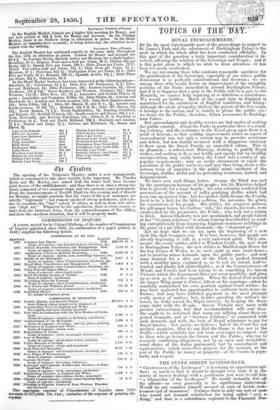TOPICS OF THrIlki.'"" ROYAL ENCROACHMENTS. rl Br far the most
objectionable part of the proceedings in respect to St. James's Park and the adornment of Buckingham Palace is the mode in which the whole affair has been conducted officially. In this part of the question a truly important consideration is in- volved, affecting the relation of the Sovereign and People ; and it is this point alone to which we wish to draw attention-it has been too much overlooked.
We are not among those who condemn reasonable sacrifices for the gratification of the Sovereign, especially of one whose public. demeanour is so perfectly constitutional and decorous ; we are among those who would desire an improvement of the unsightly portions of the Parks immediately around Buckingham Palace ; and if it so happens that a gain to the Public will be a gain to the Monarch, we cannot help rejoicing at so felicitous a coincidence. We would go further. Much of the regal state in England is althoughnedthfo eroarbetehdpee satisfactionefre,y aty shelters person of the Sovereign, it belongs to the nation, and is statebleythtetoshr ptrleettaediseesetiolee reudbmliacebeiyngeg-:: we desirePublic, therefore,
ham Palace.
But encroachment and stealthy reserve are bad modes of seeking the public consent. About the Parks in particular there is a stand- in4 jealousy, and the resistance to the Royal grasp upon them is a point of honour; so that seeking improvement under an aspect of encroachment was not only a certain way to provoke resistance and defeat, but was doubly accursed with a dangerous tendency to draw upon the Royal Family an unmerited odium. This is no phantom : a subservient Ministry, desiring to gratify Royal wishes, and seeking to do so not boldly and openly but by stealthy circumvention, may easily betray the Court into a course of un- popular requirements ; may as easily circumvent or cajole the guardians of the public interests ; and may thus bring about a dis- astrous train of impulses in the public mind-mistinst of the Sovereign, dislike, ireful and ire-provoking resistance, hatred, and deninuicement.
We have seen such things before. George the Third was met by the spontaneous homage of his people ; but his Ministers helped him to provide for a large family; his own calamity rendered him unconscious of the account of sulky grudging dislike which had been run up against him ; but his spoiled child, George the Fourth; lived to be a butt for the bitter sedition, the sarcasms, the gibes, the execrations of his people. His stables, his gorgeous palaces, his gilt-paper boxes, his Carlton "ride," his dinners, his coats, were enumerated by the paymaster, the Public ; who took out a return in libels. Queen Charlotte was not openhanded, and people talked at her " German relations," to whom rumour described her as send-0 ing surreptitiously from taxpaying England enormous cribbings in' the guise of a pie filled with diamonds-the " diamond pie " ! Let us hope that we are not upon the beginning of a new- cycle like that Georgian tera. It is true, however, that people are already beginning to talk in a very untoward spirit. They enu--- merate the costly stables added to Windsor Castle, the neiv front to Buckingham Palace, the new stables to Marlborough House for • the boy Prince of Wales, to be used eight or nine years hence ; not to mention minor demands upon the public purse : and now some demand for a slice out of the Park is pushed forward with a stealthy mien, explained so as to veil its intent, half-re- traded, and finally left unintelligible ; as if the Commitsioners of Woods and Forests had been trying to do something for Queen Victoria which the department dares not avow manfully, and giites up as soon as it excites inquiry. When Sir Robert Peel resisted' the larger Whig grant to Prince Albert on his marriage-when he' manfully maintained his own position against Court wishes-he may have neglected fine opportunities to cultivate back-stairs fluence, and may have forfeited payment in the most pleasant' ready money of smiles ; but, besides guarding the nation's if terest, he truly served the Royal interest--by keeping the Sove=- reign right with the People. Queen' Victoria may meet with' greater subserviency, but that accommodation' will cost dear. She ought to be informed that many are talking about these re- peated demands, and of " German relations;" as connected with such demands and with the look of Royal reluctance to pay for Royal fancies. Not justly, we believe ; but if the Courthas not merited suspicion, then we say that the blame is due not to the Public-which certainly has not been over-eager' to suspect-but to those who go between the Crown and the Public ; who try to • reconcile conflicting allegiances, not by an open and straightfor-: ward choice of the duties paramount, but by concealment and` equivocation ; which serve their purpose for the moment, at the cost of the Public in money or property-of the Crown in' porn,- larity and respect.


























 Previous page
Previous page